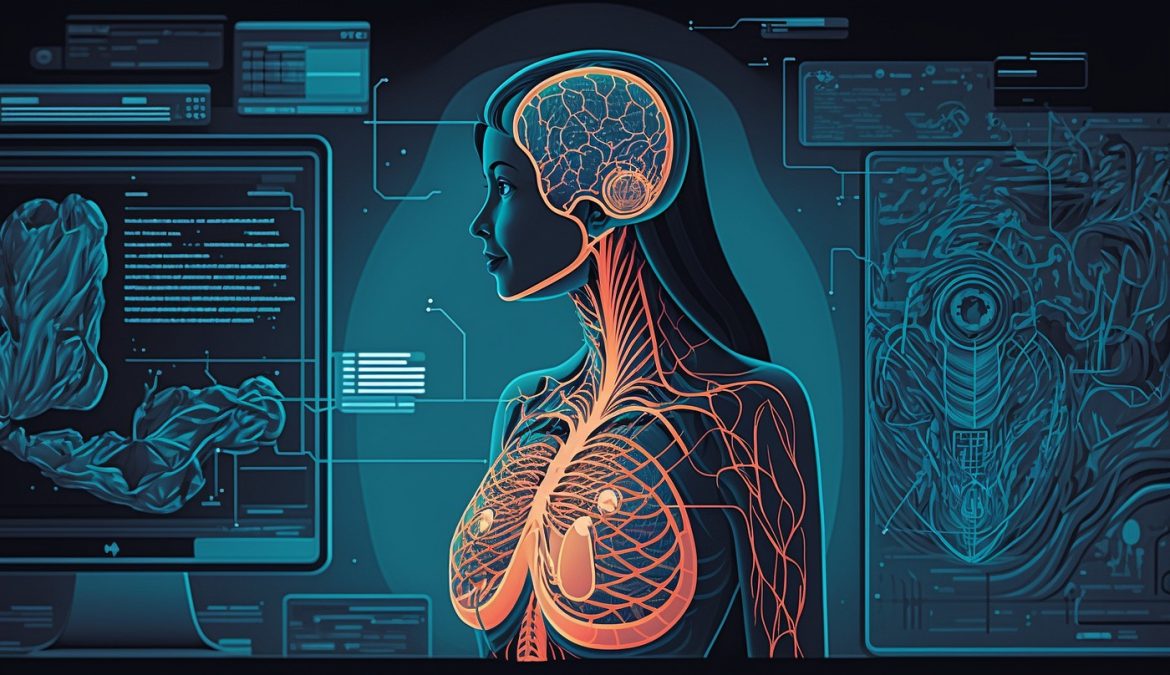In recent years, artificial intelligence (AI) has made significant strides in transforming the healthcare industry. From diagnosing diseases to personalizing treatment plans, AI is revolutionizing the way healthcare professionals approach patient care. This article delves into the profound impact of AI in healthcare, exploring how it is reshaping diagnosis and treatment strategies.
AI-Powered Diagnostic Tools
Early Disease Detection AI has brought a paradigm shift in disease diagnosis by enabling early detection and diagnosis of various medical conditions. Machine learning algorithms can analyze medical images, such as X-rays, MRIs, and CT scans, with remarkable accuracy. For instance, AI can detect subtle anomalies in mammograms, aiding in the early diagnosis of breast cancer.
Improving Radiology Radiologists are benefiting from AI-powered tools that assist in image interpretation. These tools can highlight abnormalities, provide quantitative measurements, and even suggest potential diagnoses. This collaboration between AI and radiologists enhances diagnostic accuracy and reduces the time required for analysis.
Pathology Assistance In pathology, AI algorithms can analyze tissue samples and assist pathologists in identifying cancerous cells or other abnormalities. This not only accelerates the diagnostic process but also reduces the likelihood of human errors.
Personalized Treatment Plans
Precision Medicine AI plays a pivotal role in advancing precision medicine, where treatment plans are tailored to an individual’s unique genetic makeup, lifestyle, and medical history. Machine learning models can analyze vast datasets to identify specific biomarkers and predict treatment responses.
Drug Discovery AI-driven drug discovery is accelerating the development of new medications. Machine learning algorithms can analyze molecular structures and simulate drug interactions, significantly reducing the time and resources required to bring new drugs to market. This is particularly crucial in the fight against emerging diseases and pandemics.
Treatment Recommendations Clinical decision support systems powered by AI can provide healthcare providers with treatment recommendations based on the latest medical research, patient data, and best practices. This ensures that patients receive the most appropriate and effective treatments.
Telemedicine and Remote Monitoring
Telehealth Services The COVID-19 pandemic has accelerated the adoption of telemedicine, and AI has played a pivotal role in enabling remote healthcare services. AI-driven chatbots and virtual assistants can assist patients in scheduling appointments, answering medical queries, and even conducting preliminary health assessments.
Remote Patient Monitoring AI-enabled wearable devices can continuously monitor patients’ vital signs, chronic conditions, and adherence to treatment plans. Healthcare providers can receive real-time data and intervene promptly when issues arise, reducing hospital readmissions and improving patient outcomes.
Predictive Analytics and Preventive Care
Predicting Disease Outcomes AI can analyze patient data to predict disease outcomes and identify high-risk individuals. For instance, machine learning models can assess a patient’s risk of developing conditions like diabetes or heart disease based on their health history and lifestyle factors. This allows for proactive interventions and preventive measures.
Population Health Management Healthcare organizations leverage AI to manage population health effectively. Predictive analytics can identify trends and hotspots for specific diseases, enabling targeted public health interventions and resource allocation.
Challenges and Ethical Considerations
Data Privacy and Security As AI relies heavily on patient data, data privacy and security are paramount. Healthcare providers and AI developers must adhere to stringent data protection regulations and implement robust security measures to safeguard sensitive medical information.
Bias and Fairness AI algorithms can inherit biases present in the data they are trained on. It is crucial to ensure that AI models are fair and unbiased, especially when making critical decisions about patient care.
The Future of AI in Healthcare
AI-Enhanced Medical Education AI is increasingly integrated into medical education, helping students and healthcare professionals access vast amounts of medical literature and case studies. AI-powered simulations and virtual patient encounters also aid in training and skill development.
Continuous Learning and Improvement AI models continue to evolve through continuous learning. As more data becomes available and AI algorithms become more sophisticated, their diagnostic and predictive capabilities will continue to improve, contributing to better patient care.
Integration into Healthcare Ecosystems AI is becoming an integral part of healthcare ecosystems, seamlessly integrating with electronic health records, medical devices, and telehealth platforms. This integration will enhance the overall quality and efficiency of healthcare delivery.
Conclusion
Artificial intelligence is undeniably revolutionizing diagnosis and treatment in healthcare. From early disease detection to personalized treatment plans, AI-powered tools are enhancing the capabilities of healthcare professionals and improving patient outcomes. While challenges and ethical considerations remain, the future of AI in healthcare holds the promise of more accurate diagnoses, effective treatments, and a healthcare system that is increasingly patient-centered and data-driven.

